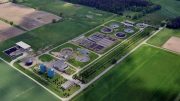Climate change means more than warmer days, less rainfall and rising sea levels – it can have a big impact on tiny microbes.
During the early Eocene period of Earth’s history, the climate changed. Despite taking centuries to occur, it’s considered a fast event. And it triggered massive ecosystem changes.
Kenny Travouillon is the Curator of Mammalogy at the WA Museum.
“The early Eocene is roughly 10 million years after the dinosaurs went extinct,” says Kenny.
“Around the world, the mammals are thriving, getting much larger and diversifying into all the modern groups of mammals that we are familiar with.
“Climate change is one of the main drivers of extinction and diversification in all species.”
REWIND, THEN FAST FORWARD
Recently, WA geochemists discovered something strange in Mexico’s Chicxulub Crater.
Fossil studies revealed that, 1000 years ago, climate change triggered algal blooms and toxic stagnation.
The culprits? Microbes.

The Chicxulub Crater in Mexico was the impact site for the asteroid that killed the dinosaurs | O.V.E.R.V.I.E.W. via WikiCommons
Fast forward to today, and our planet is undergoing another big change in climate.
So what’s happening with microbes this time around?
DECODING TINY WORLDS
Microbes – also called microorganisms – are tiny living things that can only be seen with a microscope.
Although they’re all around us, we still don’t know much about them. Currently, only 2% of microbes can be grown in a lab.
Despite their small size, if we combined all the microbes on Earth, they would be 1166 times more massive than all the humans combined.
Microbes play a crucial role in ecosystems. Many species are essential for carbon and nutrient cycling. They keep plants and animals healthy. Without microbes, we wouldn’t really have agriculture as we know it today.
Since microbes play such a key role in nature, we need to understand how they adapt to climate change.
IT’S GETTING HOT IN HERE
In Shark Bay, ancient microbes survive underwater as stromatolites and microbial mats. These ‘living rocks’ are formed by large communities of microbes and debris sticking together – literally.

Underwater stromatolites in Shark Bay, WA | Getty Images
Shark Bay’s super-salty waters protect these big microbe communities from predators and competitors.
The salinity level is maintained by local seagrasses. It’s a harmonious system under threat by rising sea levels and increased storms.
“One of the main microbes in these systems is cyanobacteria (or blue-green algae),” says Professor Brendan Burns, University of New South Wales School of Biotech and Biomolecular Science Associate.
“Climate change can cause disruptions to microbial ecosystems resulting in changing of dominant metabolisms or even bottlenecks if key organisms are lost.”
The bacteria in stromatolites cycle carbon, oxygen, nitrogen and sulphur. These nutrients keep all nearby marine life alive.
“Many microbial communities can adapt as they have been around for millions of years,” says Brendan.
“If a specific organism dies out, another will replace it with the same function to maintain balance.”
“However, that may not last forever, and eventually, an irreversible tipping point could be reached.”
YOU’RE TOXIC…
Climate change’s impact on microbes could affect human environments too, like wastewater.
Nick Turner is the Senior Principal of Strategic Programs at the Water Corporation. In his line of work, there are two types of microbes – good and bad.
Good microbes are used as an efficient tool for cleaning wastewater.
“We aerate raw sewage to grow bugs that then digest the organic material,” says Nick.
Bad microbes, on the other hand, can cause dangerous diseases.
When temperatures rise and rainfall declines, our sewer systems get stinky. Less rainfall increases the concentration of pollutants and pathogens in wastewater.
STORMY TIMES AHEAD?
A 15% decrease in rainfall is predicted across WA by around 2030. Fortunately, Nick says our wastewater systems are built to handle most increases in pollutant concentration.
“There may be more substrate organic material and less water going into the treatment plants,” says Nick.
“There may come a day when the organic strength gets such that we would have to change the treatment system, but it requires only a tweak.”
It’s also predicted that the intensity of severe storms and cyclones will increase across WA if climate change doesn’t slow down.
Severe natural disasters like storm flooding and sea-level rise may increase the risk of sewage spills. One US study found a link between waterborne diseases, sewage leaks and severe storms.
If a sewage spill did occur, toxic microbes would flow with the water. Nick says a spill probably wouldn’t happen at a wastewater treatment plant – they have infrastructure to protect against that.
Wastewater overflow is much more likely. These are smaller spills that occur around the home or local septic tanks. In worst-case scenarios, they can affect water bodies and even drinking water.
A change is gonna come
The takeaway from all this? Perhaps it’s that some things never change.
Ten million years ago, toxic microbes flourished during a changing climate. Other microbes struggled to survive the transition.
The same thing is happening now in our cities and oceans, with one difference.
This time around, the change is occurring much faster.
February 21, 2023
Thomas Crow
This article was originally published on Particle. Read the original article.


